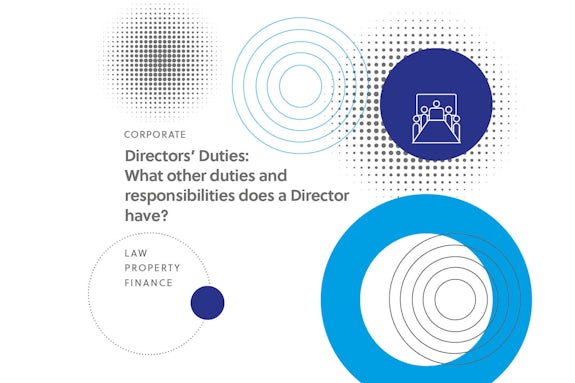
By David Winnie
May 20, 2025

In addition to the directors’ general duties within the Companies Act 2006 (“CA 2006”) as detailed in the previous blogs of this series, there are a number of other duties which directors must be aware of. These duties are as a consequence of common law, other statutes and regulations, many of which impose strict liability on directors.
There are additional uncodified duties which remain relevant including –
Directors are entitled to delegate only certain duties so long as the delegation is reasonable. However, directors should exercise caution as it was established by the judge in the recent English case of Re Glam and Tan Ltd [2022] EWHC 855 (Ch) that the director will retain the duty to supervise the performance of any delegated duties.
The case more widely deals with breaches of duties under the Insolvency Act 1986 and the duty to promote the success of the company under section 172 of the CA 2006.
This case concerned a beauty salon which went into liquidation. The company had a sole director, who did not provide the liquidator with full records or satisfactory responses to the queries raised regarding the company’s finances.
It was alleged that the director had benefitted from payment of company funds amounting to almost £150,000 which she was not entitled to. It was argued that the payments made were not legitimate business expenses as they comprised, amongst other things, payments to various relatives and unwarranted additional salary by the director.
The director claimed that any personal expenses had been repaid and the other expenses were legitimate business expenses. It was also claimed that her husband, who was a de facto director of the company (acting as a director but not formally appointed and registered at Companies House), forced the company to make loans to him and his family members under threats of violence to the director.
The court found that some of the payments were legitimate business expenses, however not all of them. Some of the loans made were found to be made for no commercial purpose and therefore the director had breached one of her duties under the CA 2006 – the duty to promote the success of the company. It was also held that the unwarranted additional salary by the director, missing cash receipts and retention of an insurance policy pay-out were further breaches of the director’s duties.
It is vital that directors understand the full extent of their duties including their general duties under the Companies Act 2006 and the additional uncodified duties which are equally as important.
If you would like further information regarding the topics discussed in this blog, please contact:
Calum Crighton: ccrighton@gilsongray.co.uk / 01224 011687
Kim Anderson: kim.anderson@gilsongray.co.uk / 01224 011694